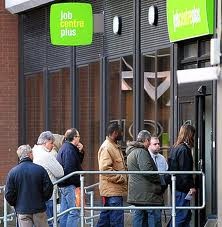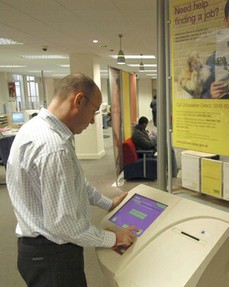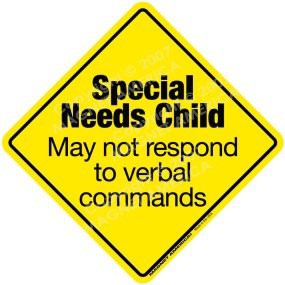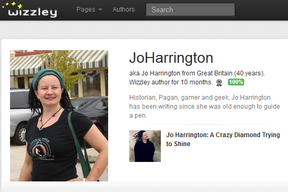 In 2008, I had just been made redundant. I had been working full time for years and the recession hadn't yet truly exploded.
In 2008, I had just been made redundant. I had been working full time for years and the recession hadn't yet truly exploded.
In truth, I waited a fortnight before signing on. I was so confident that I'd just walk into another job, that I awarded myself a little holiday. As I underwent my initial interview, it was with smiling anticipation. I had a letter in my pocket inviting me for a job interview. I was sure that I'd get it.
I told this to the new claim interviewer. He read the letter and duly made a note of the date and time. I was off to a roaring start!
Then the documentation came through. I was to sign on at precisely the exact time and date as my job interview. There was surely some mistake. I called the Job Centre. No, that was my signing time and I had to be there.
After going through a series of managers, I finally negotiated being able to attend an hour early. No sooner than that. I arrived in my interview outfit, desperately nervous about what was to follow, once I'd got the Job Centre signing out of the way.
I was made to wait. And wait. And wait. Eventually my prompting got me in front of the desk, where I was told off for my impatience. The job interview was now half an hour away, in a different town. I was asked to tell the Job Centre everything about it.
The official asked if I really thought I was suitable for that particular employment.
I did get to the job interview on time, but with only minutes to spare. I was hot, flustered and my nerves were in shreds. I did not get the job.
I thought it an anomaly, just something messed up in the system, until I was offered another job later down the line. I could be a First Aid Tutor - a job which I really wanted - but only if I had a PTLLS qualification. It could be done in a week or two. I had three weeks to get it.
As I was signing on next day, I asked if there would be funding for getting the qualification. If not, I'd pay for it myself out of my redundancy money. I was assured that there would be, but I needed to attend another interview for it.
I did achieve the funding and arrived for the course. But it wasn't PTLLS. It was a work program tailored towards the illiterate and innumerate. I was told that I had to complete thirteen weeks of it before I could go on my PTLLS course.
By now, I'd missed the deadline to attend the intensive course paid for by myself. I contacted my erstwhile employer and he regretfully informed me that he could not hold the job open that long.
Beside me in the class was a man who could have had a job, if he'd just taken a day long forklift truck driving examination. He was also here and his job had also gone. Nor were we alone. A dozen people sat in that room, in precisely the same position as us.
We all took the view that if we just saw this program through, we'd never be here again. We would have those qualifications.
But eleven weeks in, the announcement was made. The coffers were empty. None of us were going to get onto our chosen courses. Sorry.
Yet everyone there could have already been working. If the Job Centre adjudicators had been honest at the onset, or had acted quickly with the bespoke courses, not one of us would now have been drawing benefits.
"It's their jobs though, innit?" One man commented to me. "If they let us all get jobs, then what's keeping them in employment?" It felt like a fair assessment to me.



 Yesterday was Halloween. As my gallery is full of articles about ghosts, monsters, horror movies and books, it was a busy day for me.
Yesterday was Halloween. As my gallery is full of articles about ghosts, monsters, horror movies and books, it was a busy day for me. 


 You are treated as an unruly infant from the second you enter the doors. Security guards flank the entrance and more wait inside.
You are treated as an unruly infant from the second you enter the doors. Security guards flank the entrance and more wait inside. When you arrive for your first ever interview, to begin your job-seeking claim, you will encounter a lovely, friendly individual.
When you arrive for your first ever interview, to begin your job-seeking claim, you will encounter a lovely, friendly individual. 

 In 2008, I had just been made redundant. I had been working full time for years and the recession hadn't yet truly exploded.
In 2008, I had just been made redundant. I had been working full time for years and the recession hadn't yet truly exploded.  I was so naive in 1995. I skipped out of my graduation ceremony into the dole office, bright-eyed and bushy-tailed.
I was so naive in 1995. I skipped out of my graduation ceremony into the dole office, bright-eyed and bushy-tailed.  The last time I cried over it was a couple of weeks ago. Someone intimated that I should stay out of a debate, as I patently didn't want to make money at Wizzley.
The last time I cried over it was a couple of weeks ago. Someone intimated that I should stay out of a debate, as I patently didn't want to make money at Wizzley.




 St Tydecho's Churches in West Waleson 09/03/2014
St Tydecho's Churches in West Waleson 09/03/2014
 Goodies for an Outlander Premiere Partyon 03/06/2015
Goodies for an Outlander Premiere Partyon 03/06/2015
 Holocaust Memorial Day Interview with Rainer Höss, Grandson of Rudolf Architect of Auschwitzon 01/24/2015
Holocaust Memorial Day Interview with Rainer Höss, Grandson of Rudolf Architect of Auschwitzon 01/24/2015
 Romantic Valentine Gifts for an Outlander Fanon 01/16/2015
Romantic Valentine Gifts for an Outlander Fanon 01/16/2015



Comments
Thank you for the confidence boost. We both will and you'll get back on the road again.<3
Jeez Loouise! I haven't been through anything that bad, but I waited until I was on Social Security. It's not much, but it pays the rent. Of course I can't afford a car, but hoping I'll be making a few bucks too. (no public trans out here...) You'll make it. I know you will!
Companies like Tesco are certainly doing well out of unemployment. In fact, any nation has, which could have a free and extensive workforce, for which it had to offer no payment.
I would love to have heard what George Orwell had to say about today's situation, though he possibly already said it all in 1984. We're certainly the most watched nation on Earth.
The Job Centres may not be the Sustainable and Satisfying Career Centre, but they should be encouraging jobs. It's been my personal experience (twice) that they are not. They will actually act to stop you achieving employment, for all the guilt tripping and aggressively bureaucratic lip-service that they pay to that.
We often miss the fact that unemployment is actually a good thing for employers. The pool of unemployed is a resource they can use if they need it, and it's existence makes labour a buyers market which keeps the price down. Unemployment rates go up and down, but unemployment never really goes away. Businesses are quite happy with that, especially if they don't have to pay much of the cost. Full-employment would be a real problem to them if it ever happened. Given the important role of the unemployed, in helping to keep the economy dynamic and competitive, it seems especially unfair to treat them so harshly. But, the whole thing wouldn't function if unemployed people were allowed to be happy. I wish George Orwell were alive today, he'd put it across much better than I can, but his answer would probably be more socialism. Personally, I think we need more self-employment and small businesses, probably very small businesses. Unfortunately, Job Centres aren't there to support this, but you might find other organisations that do. For the over 50s, there's the Prince's Initiative for example. Sadly, the Job Centre will just do what it's meant to, and keep the excess workers on their toes. It's called the Job Centre, not the Sustainable and Satisfying Career Centre.
What makes mine so disturbing is that I have it relatively good compared to some, and I'm certainly not alone. Worrying times for everyone.
I can certainly relate to what you're saying about Disability Allowance, though fortunately it's at one step removed. A friend of a friend (really! I know that's cliched, but I swear it's true) was in hospital on her deathbed. She was told that she could still work and therefore wasn't eligible for Disability. She died shortly afterwards.
This happened in Liverpool too. A father came back from the hospital after witnessing the death of his adult son. The recently deceased had spent six months being denied disability and had filled in endless forms, while terminally ill. The father found a letter on the doorstep from the DPW once again declaring his son fit to work.
And the father got angry. He channeled all of that anger into a court case, suing the government for making his son's last six months Hell. As far as I'm aware, it's still on-going.
Thank you so much for your advise. Another Wizzley author has DMed me with much the same too. I'm certainly going to pursue it. As for the tax thing, I'm not worried about that. Before my redundancy, I was working for a Mexican tour operator, as an English language content writer for their website and blog. As I wasn't on a British P.A.Y.E. I had to declare my own tax in a self-assessment form.
I'm still doing it. I'm just declaring the Jobseekers' Allowance too.
Thank you for having my back here. It's very much appreciated. <3
Jo, I can relate to everything in your article. Why? Because all this happened to me after I signed on following my coma incident. And you are right, trying to claim disability benefit is a joke. I could hardly walk, let alone hold down a job, yet the system deemed that I could do 'some kind of work'. Of course I could, they were right - but nobody in their right mind would employ someone who could hardly stand, had very short concentration periods and became tired after about an hour of trying to concentrate on something.
And like you I thought writing for a living would get me out of that situation.
But unlike you I found an alternative way of using the system so it worked for me, rather than against me.
This is what you should do ===
declare that you will be going self-employed, and that you will be working > 30 hours per week doing it. Ask for all the documentation necessary. Find out about Tax Credits for the self-employed.
If things have not changed (and it may be that certain payments were due to me because of my age, and the amounts may have changed) you will find that: due to your 1 year unemployment record, you can receive £100 for becoming self-employed (finding work I think they call it); receive £50 per week for 10 or 12 weeks as an interim payment; receive just under that which you are getting on the dole, as Tax Credit, without end; not have to sign on ever again; receive housing benefit and Council Tax rebate from your council because you receive less than a living income (until you start to see some return on your investment in writing at Wizzley); not have to worry that you could break the law; most certainly not be restricted to 10 hours writing ever again.
The downside is that you will have to declare your income for tax purposes, once per year; do same to Council twice per year; fill out the forms for Tax Credits once per year.
You will be removed from the unemployment figures.
The upsides outweigh the downsides 1000%. DM me if you want to discuss further.
I'm glad that you think so. Thanks for reading.
An excellent article. Thank you
Yep, that is precisely what will happen. It's what happened last time. I haven't even gone into detail about the thirteen week course, but that the lunatics did take over the asylum. Boxes were ticked.